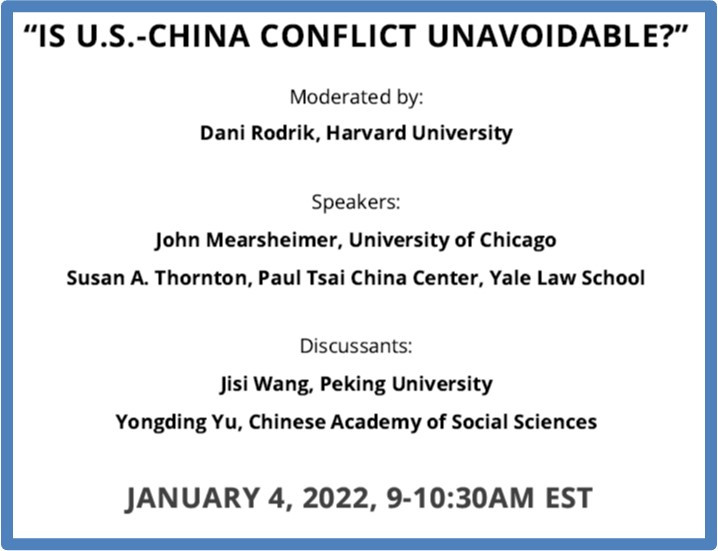When: 4 January 2022, 9:00-10:30am US EST (GMT-5)
Sponsor: International Economic Association
Moderator: Dani Rodrick
Participants: John Mearsheimer (University of Chicago); Susan Thornton (Yale University); Jisi Wang (Peking University); Yongding Yu (Chinese Academy of Social Sciences)
Registration: here

The post-1990 model of hyper-globalization is under serious challenges. While a few emerging economies, noticeably China and India, have raised their respective average citizen’s living standards, inequality has increased in almost every country. Economic polarization has led to political polarization in advanced countries, and inter-continental migration from the global south has only increased the tension. The rise of China has posed a particular challenge to the United States and its allies. China is not a liberal democracy and its economy has adopted a mix model of markets and state intervention, if not one that is wholly controlled by the state. The country’s approach to combat COVID-19 has also added the west’s worry that its authoritarian model would gain ground worldwide. China and the US are entering a new stage of rivalry. On the economic front, the two countries have been engaged in a tit-for-tat trade war, and both countries have imposed export bans toward the other country.
Those developments have inspired a wide-range wave of commentaries on the new global order. While some of them insist on the America-led liberal order, others propose new forms of order. Those efforts notwithstanding, the order(s) that will shape international relations in the remainder of this century are hard to predict. Instead of searching for new orders, it is probably more productive to find a rational framework that allows countries to forge future orders, or to preserve old orders.
The IEA has convened this working group of scholars to discuss a framework for countries with conflicting interests to negotiate with each other. The premise of this roundtable is two folds. First, different norms or principles might prevail in different issue areas or regions, and relations among states and other actors are more likely to be regulated by a complex, partial, sometimes inconsistent, and ever-changing set of rules, norms, and procedures. Second, except basic human rights, a world order that preserves peaceful coexistence does not need countries to subscribe to a wide-range and comprehensive set of political values and economic practices. Different countries have different history which in turn determines their political values. Countries are also at different stages of economic development and commensurate economic practices may be needed. Better changes are always carried out by people within a country, not imposed by outsiders. The framework we aim to develop would provide the procedures and standards for countries to negotiate their bilateral or multilateral relationship.
When you subscribe to the blog, we will send you an e-mail when there are new updates on the site so you wouldn't miss them.